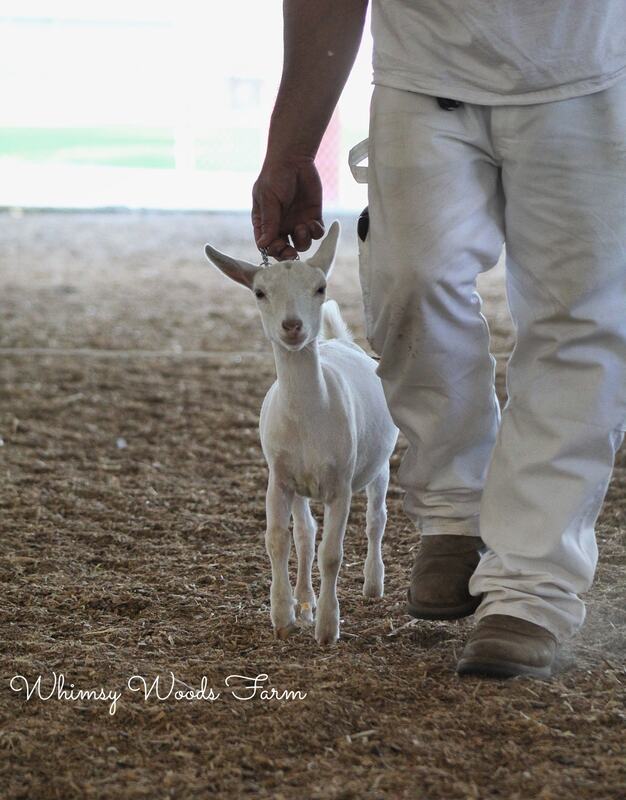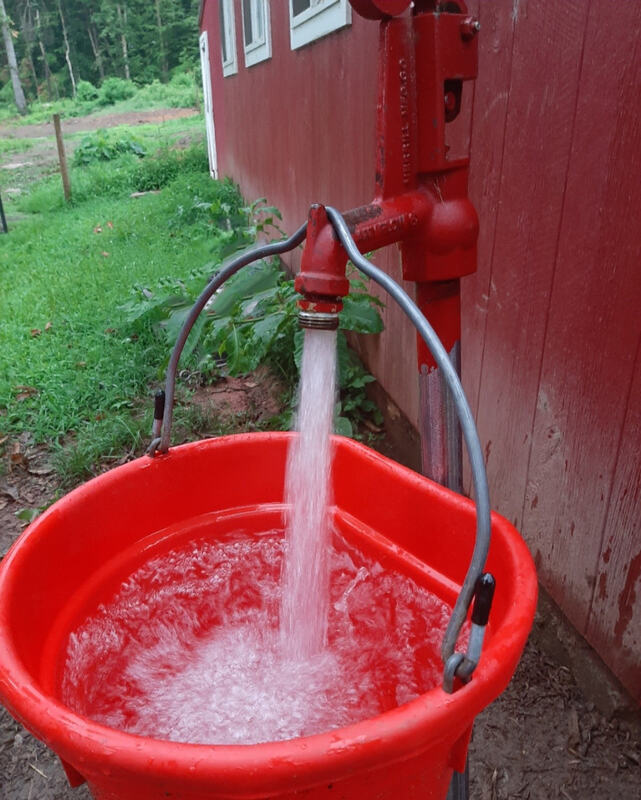|
What's it like showing baby goats you ask?
You start out by spending weeks training them to walk on a collar, the same way you train a puppy to walk on a leash. Things go great, and the night before show day you think to yourself, "we've totally got this!"... Show day rolls around and there is that magic spark in the air that only competitions bring to life. You wait patiently for your turn, all the while encouraging your little caprine partner that they're doing a great job. You get them out of the pen a little before showtime to practice, and once again they prance around like they were born to do this. Your confidence is once again restored. Your class is then called and you head to the ring, all the while your show companion is trotting perfectly by your side. You register at the ring gate, head in, and stack up. At this point you're feeling like all those weeks of practicing and breaking your back doing it are about to pay off. "Let's see them walk, please!" the judge calls out. You began walking around the ring when suddenly you realize the little kid sidekick you walked in with has dramatically transformed. Instead of the perfect, angelic, fuzzy little cutie you walked in with you find yourself attached to something that is part rodeo bull, part alligator who has perfected their death roll, and part Satan's spawn. You do your best to smile and keep it together and reassure them that they're doing ok, but the new little beast you're now leading around the ring will hear none of it. The judge then stops the line, and for a split second as you are restacking your goat you catch a glimpse of the kid you left home with. Suddenly, like magic words, the judge asks you to walk again and the little monster re-emerges pulling a full out Jekyll and Hyde performance for all to see. Finally, (much to your relief at this point) winners are picked and you are dragged out of the ring by something the size of a small dog but the tenacity of a wild mustang. You exit the ring breathless, red faced, and wondering if your chiropractor will see you on a weekend. You look down to see your kid looking up at you with wide eyed innocence. It then prances happily back to it's show pen. Oh, those cheeky juniors!!!! .. and the sad part is, I'd do it all over again first chance I got! Pictured: Whimsy Woods Spoonful Of Sugar aka "Sugar"
0 Comments
I get asked frequently how we handle our livestock during the humid hot heat of a PA summer. Goats tend to handle the summers here quite well, although heat can be very stressful on them under certain living conditions. Providing them with the tools needed to help beat the heat will make for a much happier herd. Here’s what has worked for us over the years during the dog days of summer!:
1. Water- water-water!: Of course to help keep goes hydrated, they need to drink. During the hotter days, we use flat back buckets around all the pastures and in stalls and they are replenished regularly (1-2 times per day at minimum) with fresh water to help cool the girls down. 2. Shade- Whether it be a makeshift pasture play structure that they can lay under, a stall, or under a tree, goats love the shade in the summer. If you stand out in the pasture for five minutes under the blazing sun and then step into the shade you’ll totally appreciate why they like a shady cool spot to relax. Our goats also prefer dry dirt area free of most of the vegetation (I think the dry dirt feels cooler to them than the plant matter). 3. CLEAN buckets- I seriously cannot stress this enough. If you want to help keep your goats hydrated, give them a clean water source to drink from. It sounds like common sense, but goats are very picky about their water. If there is bugs, hay, grass clippings, dirt, algae, or poop floating in their bucket it’s pretty much a turn off to them. We change our goats buckets out frequently and will even replenish a full bucket if it has debris floating in the top. It is not uncommon during hot days for the goats to drink tons of water (especially if they’re lactating) and this is especially a good practice year round when encouraging your bucks to drink (which helps promote a nice clean healthy urinary tract). If you’re using a trough for your goats, no worries! Just make sure that you’re emptying the trough and scrubbing it out periodically and keeping it as clean as possible. Your goats will definitely thank you! 4. Electrolytes- This is one of those sentences where I will say, “We use electrolytes.. BUT….”… and here is the “But” that follows- we do provide our goats electrolytes in their water especially on those very hot days..BUT… I do note make this their ONLY source of water. Some goats do not like the taste of electrolytes, and as a result you will actually cause them to drink less and therefore dehydrate faster by providing them with this well intentioned supplement. We provide our guys with a bucket of electrolyte water in addition to their fresh water. When you think about it, sometimes a cool bottle of water is just more appealing to you on a hot summer day than a Gatorade, and the goats basically feel the same way. For our electrolytes, we use and have had good success with Bluelite electrolytes for goats. 5. Fan- If you are lucky enough to have electric in your barn, you can treat your goats to the luxury of a fan during the summer months. There are all kinds of stall fans available on the market and the goats definitely enjoy the cool breeze, plus it also helps deter flies from landing on them on days when the bugs are bad. 6. Don’t just worry about the outside temp!- Keep a thermometer in your barn area. It’s so handy to have one readily available if you see a goat that appears that they might be over heated! Most often if you call a vet for a goat that is down or lethargic, one of the first things they’re going to ask you is if you’ve checked their temperature. You can use the basic 10 second thermometers found at any store. 7. Take 10 minutes- This is something I am in the habit of doing every day, but especially when weather conditions are harsh. Take 10 minutes out of your day to walk around and observe your goats without interacting with them. No one knows them better than you, and every time I have caught a problem early, it was because I was standing there observing them from afar and notice one just was not acting like the others or wasn’t moving about like the others. Taking that little bit of time every day familiarizes you with how your herd normally looks, so you’ll know when someone looks “off”. This technique became very important to us especially after this year-short story- I was driving the tractor back home near sunset and noticed that one of our bucks standing way out in their pasture looked “off”. I mentioned something to my husband and he said “he looks ok to me..”, but to me, he didn’t look like he normally does hanging out happily in the pasture with his fellow bachelors. He looked slightly depressed, and something didn’t feel right. I parked the tractor and grabbed my thermometer and tempted him and lo’ and behold his temp was raging. After a call to our vet, he ended up being treated for pneumonia and due to catching it early made a speedy and full recovery. Maybe it was my “mom intuition” or maybe it was just being really in tune with my guys, but I strongly feel that just spending that time getting to know your animals in their normal setting is so very important and may even prove lifesaving one day. Stay Cool Everyone! |
Categories |
Proudly powered by Weebly



 RSS Feed
RSS Feed